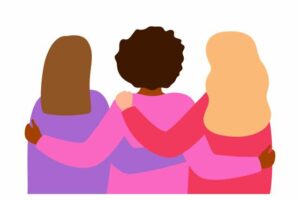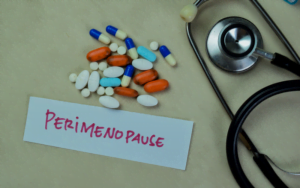As women, we embark on a unique and transformative journey through various stages of life, and one significant phase that often brings its own set of challenges and changes in premenopause. This transitional period, occurring before menopause is a time of hormonal shifts, physical adjustments, and emotional fluctuations. This blog will delve into the intricacies of the premenopausal age, offering insights, tips, and support for women navigating this transformative stage.
Contents
What Is Premenopausal Age?
 Premenopausal age refers to the stage in a woman’s life leading up to menopause, a natural biological process marking the end of reproductive years. During this phase, typically from the late 30s to early 50s, a woman experiences hormonal fluctuations as the ovaries gradually reduce the production of estrogen and progesterone. These hormonal changes can give rise to a range of physical and emotional symptoms, including irregular menstrual cycles, mood swings, hot flashes, and changes in libido.
Premenopausal age refers to the stage in a woman’s life leading up to menopause, a natural biological process marking the end of reproductive years. During this phase, typically from the late 30s to early 50s, a woman experiences hormonal fluctuations as the ovaries gradually reduce the production of estrogen and progesterone. These hormonal changes can give rise to a range of physical and emotional symptoms, including irregular menstrual cycles, mood swings, hot flashes, and changes in libido.
While premenopause is a natural and inevitable part of aging, its impact varies among individuals, and understanding these changes is crucial for women to manage their well-being during this transitional period effectively. The journey through the premenopausal age is unique for each woman, and embracing it with awareness and proactive health measures can contribute to a smoother transition into the subsequent stages of life.
What Age Is Normal For Premenopausal?
Premenopause typically occurs in the years leading up to menopause, which is the average age of 51 in most women. Premenopausal age can vary, but it commonly begins in the late 30s or early 40s. However, the timing of premenopause is highly individual and can be influenced by factors such as genetics, lifestyle, and overall health. Some women may experience symptoms of premenopause earlier or later than others.
It’s essential to recognize that the age at which premenopause starts can differ widely among women, and there is no one-size-fits-all answer. If women have concerns about premenopausal symptoms or are curious about their hormonal health, consulting with a healthcare professional can provide personalized insights and guidance.
What Are The Possible Causes Of Premenopause?
 Premenopause is primarily a natural biological process that occurs as a woman’s body gradually transitions from the reproductive phase to menopause. The primary cause of premenopause is the aging of the ovaries and the subsequent decline in the production of hormones, particularly estrogen and progesterone. However, several factors can influence the onset and experience of premenopausal symptoms:
Premenopause is primarily a natural biological process that occurs as a woman’s body gradually transitions from the reproductive phase to menopause. The primary cause of premenopause is the aging of the ovaries and the subsequent decline in the production of hormones, particularly estrogen and progesterone. However, several factors can influence the onset and experience of premenopausal symptoms:
- Genetics: Family history plays a significant role in determining the age at which a woman may enter premenopause. If a woman’s mother or sisters experienced an early or late onset of menopause, it could influence her reproductive timeline.
- Lifestyle Factors: Certain lifestyle factors can impact the timing and severity of premenopausal symptoms. Factors such as smoking, poor nutrition, lack of exercise, and high stress levels may contribute to an earlier onset of pre-menopause.
- Medical and Surgical Factors: Certain medical conditions and surgical interventions can affect reproductive health. For example, conditions like polycystic ovary syndrome (PCOS) or a history of gynecological surgeries may influence the timing of premenopause.
- Body Weight: Body weight can also play a role, as both underweight and obesity have been associated with changes in reproductive function. Women with extremely low or high body weight may experience alterations in hormonal balance. Potentially affecting the onset of premenopause.
- Ethnicity and Race: Research suggests that there may be variations in the age of menopause onset among different ethnic and racial groups. For example, some studies have observed that women of African descent may experience menopause slightly earlier than women of European descent.
It’s important to note that while these factors can influence the onset of premenopause, the process is primarily a natural part of aging. If women have concerns about premenopausal symptoms or reproductive health, consulting with a healthcare professional can provide personalized advice and guidance.
What Are The Symptoms Of Premenopausal Age?
Premenopausal age is characterized by a variety of physical and emotional symptoms resulting from hormonal fluctuations as the body transitions toward menopause. It’s important to note that the severity and combination of symptoms can vary widely among women. Common symptoms of premenopause include:
- Irregular Menstrual Cycles: Changes in the length and regularity of menstrual periods are a common hallmark of premenopause. Cycles may become shorter, longer, or more unpredictable.
- Hot Flashes and Night Sweats: Sudden and intense feelings of heat, often accompanied by sweating, can occur, particularly in the upper body and face. Night sweats may disrupt sleep.
- Mood Swings and Emotional Changes: Hormonal fluctuations can contribute to mood swings, irritability, anxiety, and feelings of sadness. Emotional resilience may be affected during this time.
- Changes in Libido: Some women may experience a decrease in sexual desire or changes in sexual function due to hormonal shifts.
- Vaginal Dryness and Discomfort: Declining estrogen levels can lead to changes in vaginal tissues, resulting in dryness, itching, and discomfort during sexual activity.
- Sleep Disturbances: Insomnia or disrupted sleep patterns may occur, often related to night sweats or increased susceptibility to stress.
- Weight Gain: Changes in metabolism and hormonal fluctuations can contribute to weight gain, particularly around the abdominal area.
- Breast Tenderness: Some women may experience breast tenderness or changes in breast tissue density.
- Headaches: Hormonal fluctuations can trigger headaches or migraines in some women.
- Joint Pain: Changes in estrogen levels may contribute to joint pain or stiffness.
It’s important to recognize that while these symptoms are common during premenopause, they can also result from other health conditions. If women are experiencing bothersome symptoms or have concerns, it is advisable to consult with a healthcare professional for a thorough evaluation and personalized guidance.
How To Give Support In Premenopausal Age?
 Support during premenopausal age is crucial as women navigate the physical and emotional changes associated with this transitional phase. Here are several ways to provide support:
Support during premenopausal age is crucial as women navigate the physical and emotional changes associated with this transitional phase. Here are several ways to provide support:
Open Communication
Encourage open and honest communication about the physical and emotional experiences associated with premenopause. Creating a safe space for discussion helps women feel understood and supported.
Educate and Normalize
Provide information about premenopause to dispel misconceptions and normalize the experiences women may go through. Understanding that these changes are a natural part of aging can help alleviate anxiety and uncertainty.
Offer Empathy
Show empathy and understanding for the challenges women may face during premenopause. Acknowledge the validity of their feelings and emotions, and offer reassurance that they are not alone in this journey.
Be Patient
Recognize that premenopausal symptoms can be unpredictable and vary in intensity. Be patient and understanding during moments of mood swings or discomfort, and avoid making assumptions or judgments.
Assist with Lifestyle Changes
Support healthy lifestyle choices that can help manage symptoms. Encourage regular exercise, a balanced diet, stress reduction techniques, and sufficient sleep to promote overall well-being.
Accompany to Healthcare Appointments
Accompanying a woman to healthcare appointments, especially if she is seeking guidance on managing premenopausal symptoms, can provide emotional support and help ensure that important questions are addressed.
Learn About Hormone Therapy
If hormone therapy is being considered, educate yourself about the options available. Understanding the potential benefits and risks of hormone therapy can contribute to informed decision-making.
Provide Practical Assistance
Offer practical assistance with daily tasks during periods of discomfort or fatigue. This can include helping with household chores, childcare responsibilities, or providing a listening ear.
Encourage Self-Care
Emphasize the importance of self-care and encourage women to prioritize activities that bring them joy and relaxation. Whether it’s reading, hobbies, or spending time with loved ones, self-care is essential for mental and emotional well-being.
Connect with Support Groups
Suggest joining local or online support groups where women going through similar experiences can share insights, advice, and encouragement. Peer support can be invaluable during this phase.
Supporting someone through premenopausal age involves a combination of emotional understanding, practical assistance, and encouragement for healthy lifestyle choices. Tailoring support to the individual’s needs and preferences is key in fostering a positive and empowering experience during this transitional period.
Conclusion
In conclusion, premenopausal age is a unique and natural phase in a woman’s life, marked by hormonal changes that can bring a variety of physical and emotional experiences. Embracing this journey with understanding and support is essential. By prioritizing healthy lifestyle choices, maintaining open communication, and offering empathy, women can navigate premenopause more smoothly. Remember, every woman’s experience is different, and there is no one-size-fits-all approach.
Together, let’s create a supportive environment where women can confidently embrace this transition, empowering them to prioritize their well-being and live their best lives during premenopausal age. If you are facing menopause-related issues, menopause treatment at HerMantra can help. Book your free trial online menopause treatment session now.


